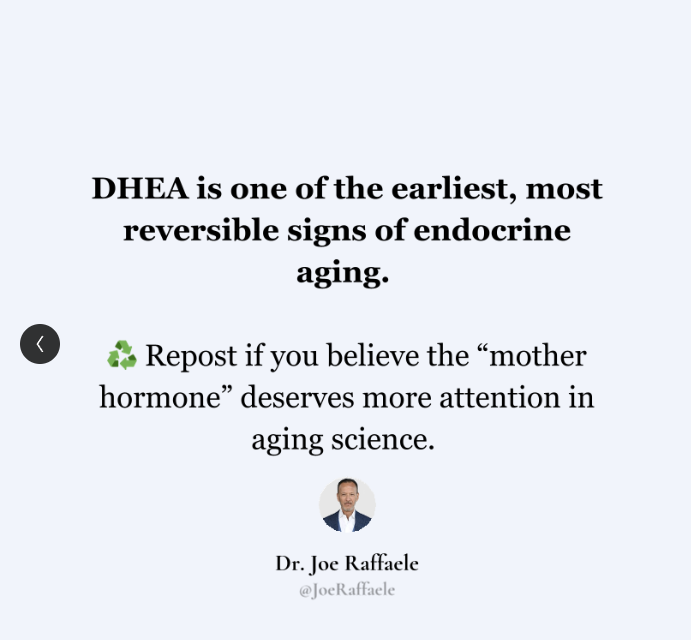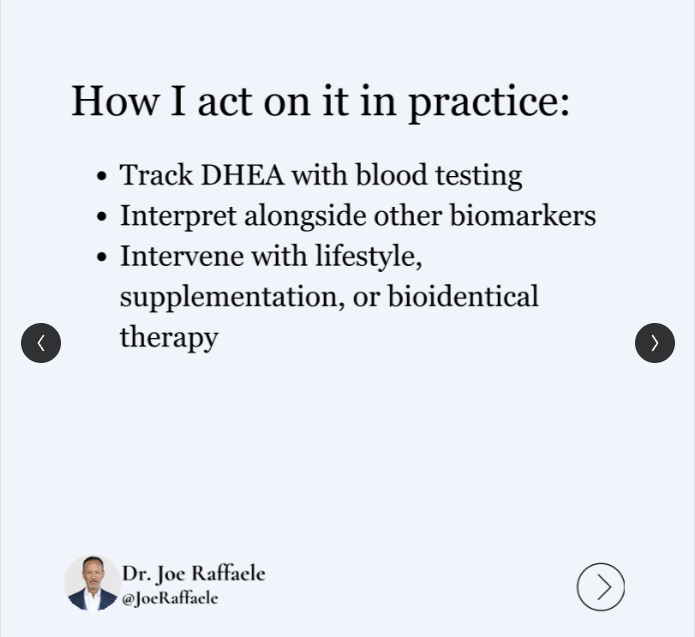
Joseph Raffaele: Everyone Asks Me About Testosterone. Few Ask About DHEA
Joseph Raffaele, Physician-Scientist in Longevity Medicine, shared a post on LinkedIn:
“Everyone asks me about testosterone.
Few ask about DHEA – but they should. Here’s why…

Sometimes nicknamed the “mother steroid,” dehydroepiandrosterone (DHEA), measured as its stable circulating form DHEA-S, is one of the most abundant hormones in the human body and one of the most overlooked in routine medical practice. Yet in the context of a longevity clinic, it deserves careful attention. From this single precursor, the body synthesizes testosterone, estrogen, and other downstream hormones.
DHEA levels peak in early adulthood and then decline steadily with age, often dropping by 80–90% by the eighth decade of life, leaving you more vulnerable to inflammation, metabolic dysfunction, and cardiovascular disease.
Compounding this natural fall, chronic stress accelerates DHEA depletion by tilting the adrenal balance toward cortisol production, leaving patients with a double hit of lower anabolic reserve and higher catabolic burden.
Why does this matter?
Because DHEA is not just a reproductive hormone precursor.
It is a pleiotropic regulator with wide-ranging effects:
– Cardiovascular Health: Higher DHEA-S levels are associated with better endothelial function, vascular elasticity, and reduced atherosclerotic risk. Low levels correlate with higher rates of cardiovascular events and mortality.
– Immune Function: DHEA enhances thymic activity, supports T-cell proliferation, and helps counteract the immunosuppressive effects of excess cortisol. Low DHEA-S is linked to frailty, impaired vaccine responses, and increased infection risk in older adults.
– Cognitive and Mood Resilience: Through neurosteroid activity, DHEA modulates neurotransmission and helps buffer against stress, depression, and cognitive decline.
How do we act on it?

In a comprehensive longevity practice, measuring DHEA-S provides actionable insight into both biological age and resilience. When clinically indicated, restoring DHEA to youthful physiologic levels via lifestyle optimization, stress reduction, or carefully dosed supplementation can be a cornerstone strategy to preserve vitality, cardiovascular integrity, and immune competence.
Longevity isn’t just about extending years, it’s about preserving function and quality of life.
Optimizing DHEA is one of the simplest, evidence-based steps to support both.
That said, there are a few caveats to be aware of. DHEA is comedogenic, meaning supplementation to restore healthy DHEA-S levels can sometimes trigger pimples or acne in those who are prone. A good approach is to start low, 2.5–5 mg daily, and increase in 5 mg increments only as needed.
In women, DHEA can also raise testosterone levels, since it is a key source of testosterone production in the adrenal glands.
If we ignore DHEA, we miss one of the most important predictive markers for extending healthspan.
Repost if you believe the “mother steroid” deserves more attention in aging science.”
Stay informed with Hemostasis Today.
-
Jan 10, 2026, 14:40Last day at ASH25 from Riten Kumar
-
Jan 10, 2026, 08:56Shivanand Kumatagi Reflects on His Visit to Rela Hospital
-
Jan 10, 2026, 08:48Mitchell Elkind: Why Is The American Heart Association Holding a Brain Health Symposium?
-
Jan 10, 2026, 08:41Fiona Robinson Invites You to NBDF Webinar on Research Grants
-
Jan 10, 2026, 08:30Melissa Korn Takes Front Page Award for Her WSJ Piece on Experiencing a Pulmonary Embolism
-
Jan 10, 2026, 08:20Aymar Akilimali on Malaria in the Democratic Republic of Congo
-
Jan 9, 2026, 12:17Louise St Germain Bannon Invites You to Self-Nominate for the ISTH Council
-
Jan 9, 2026, 09:25Emma Groarke Shares A Comprehensive Review on VEXAS Syndrome
-
Jan 9, 2026, 09:13Anirban Sen Gupta Presents PlateChek
